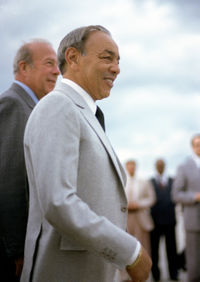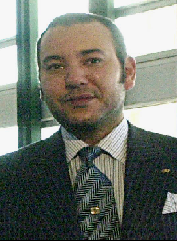Constitutional Monarchy
Morocco throughout history has also been ruled by constitutional monarchy. The monarchs that led the country has a limited power over his people. These power includes influence on religion as well as command of government actions. Unlike an absolute monarchy, there are two restaint that seperate these two classes. Constitutional monarchs are not the sole power of political actions, but are instead, limited by the constitution of the country.
King Hassan II

King Hassan II was one of the many famous rulers of Morocco. His reign lasted from from 1961-1999 as the constitutional monarch of the country. He was well known for his contribution to improving the country's economic power. The king expanded on several areas of income such as agriculture, tourism, and phosphate mining, which is now the biggest industry there. On a map, you may notice that there is another area south of Morocco named Western Sahara (Morocco). This work was done by the king himself when he reclaimed the territory from the Spanish.
Despite of his major contributions, he was also much critized during his term. This was due to his attitude towards human rights as he often belittled it. As a result, opposition forces often attempted assassnation. Two instances of this sort were recorded. One of the two includes a endeavor made by the Royal Moroccan Air Force when they tried to shoot down his Boeing 727. The second was carried out by a resistance force during his vacation in an ocean resort. Fortunately, both of these resulted in failure.
Currently, the monarch of Morocco is Mohammed VI, the son of Hassan II. Before being king, he held the title of Crown Prince, meaning he was to be the new in line for the crown. He was enthroned July, 23, 1999 just two hours after his father died. Many today recognize him as a legitimate constitutional monarch. For example, one thing he differ from his father is his effort to provide human rights to his country. When he took his throne, he announced nationally via television that he would address problems of poverty and corruption. Since then, he has made several major change. Of one of those, it included his endeavor was when he came up with the code law named Mudawana, which provided more rights for women (signed in 2004). Moreover, he today continues to strengthen the country's economy.

